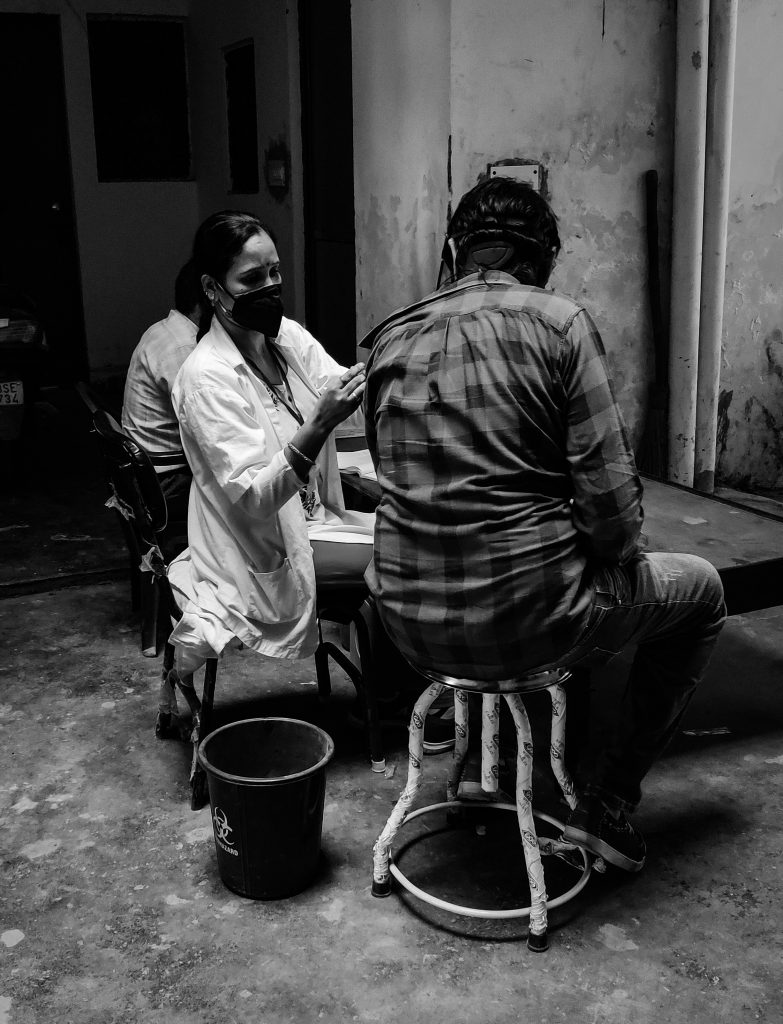

We are gritty individuals. We survive amidst chaos and thrive, while at it. Or you could just as well say that grit is an excuse for us to not be able to change our environment or compensation for the feeling of inadequacy. Whatever it is, the persistent grit of individuals and healthcare providers in Bihar means that people have access to (mostly) affordable and approachable healthcare in the state. The shoddy infrastructure of public healthcare and paralysis of health policies has created a vacuum and an incubator setting for private healthcare in Bihar. Private healthcare in this context means healthcare being provided by private hospitals and physicians, unaided by state funds, and being accessed by people paying out of their pocket or through insurance coverage.
Starting with the primary levels of healthcare infrastructure, private players have infiltrated the system in many roles and many ways. Most villagers in Bihar, on falling sick, first approach local quacks or traditional healers. Quacks or roughly called “jhola-chaap doctors” are unregistered healthcare workers that set up their practice in remote areas, rural villages, smaller towns, and smaller hidden neighborhoods. Most of them have worked for few years under a local physician or in a chemist shop and “graduate” on to start their private practice. At many places, they command huge respect among locals, especially villagers with poor health illiteracy. As you would suspect, for the lack of structured medical training, their treatment and diagnosis are based on experience and trial-and-error. While they cater to a big section of society and often provide critical (in many instances only care) care to people, their medical advice lacks any evidence or structure. If lucky, people with minor ailments get well with symptomatic medications provided by them. If on the wrong side of luck, they end up with complications and side-effects, often dangerous and fatal. Other local providers, unregistered in the system and untrained, are local chemists and pharmacists. It is a common occurrence for chemist shops to act as diagnostic and treatment centers and pharmacists (most without any training in pharmacy) managing these shops provide over-the-counter medications for people presenting with a range of ailments. When medications are so easily available, people often do not visit trained modern allopathic physicians, until it’s too late in the disease course.
The quacks are not the only private players in the local healthcare system. Physicians, wholly trained and registered, prefer private practice over working in public healthcare infrastructure. Lack of essential resources, poor pay and compensation, difficult working hours, impractical commute and remote postings, and a general lack of control over their career and work continues to drive physicians out of public healthcare to private practice or work in one of the up-and-coming corporate hospitals. Even for people in general, there is a greater trust and belief in treatment given by private physicians than by state-run hospitals.
In the capital city of Patna and most district headquarters, scores of small clinics, private practices, and individual practitioners have cropped up. Many operate out of chemist shops or small holes in the wall with word of mouth as their only publicity model. It has created a chaotic and confusing scenario where people with poor health literacy and poor general awareness are unaware of what care they seek or where they should go. Most people with minor trouble of headaches have easy access to well-experienced neurosurgeons while in other instances people with emergency cardiac issues have a lack of access to cardiologists. In this chaos, many exploit an opportunity to practice out of their scope, provide treatment without evidence, seek unnecessary and expensive tests, and in certain instances unregistered physicians posing as registered ones. Of numerous boutique private hospitals or bigger corporate hospitals, many have become infamous for exorbitant costs, unnecessary tests, and poor care. However, despite the chaos and so many challenges, the state has produced innumerous physicians who chose to practice privately or in private healthcare and earned huge respect, fame, and success.
As one would expect, such heavy reliance on private healthcare apparatus has driven out payment costs to the sky. Many people suffer from lifelong financial catastrophe if they fall ill. The public, even the well-educated ones dwelling in cities, still suffer from poor health literacy. Insurance penetration is poor and most pay out of their savings. Amidst all of it, many choose to migrate out of state to seek better medical care to far-off cities and states. In many instances, they end up with a similar or worst quality of care despite spending a lot.
The factors leading to the privatization of healthcare facilities in Bihar and shoddy public healthcare are multiple and complicated. They need a better understanding of the local economy, climate, institutions, polity, geography, and history. It also needs better familiarity with the psychology of individuals and masses in Bihar. In the next blog, we will seek to understand some of it.
More from Dr. Ankit Raj here.
BCPHR.org was designed by ComputerAlly.com.
Visit BCPHR‘s publisher, the Boston Congress of Public Health (BCPH).
Email [email protected] for more information.
Click below to make a tax-deductible donation supporting the educational initiatives of the Boston Congress of Public Health, publisher of BCPHR.![]()
© 2025-2026 Boston Congress of Public Health (BCPHR): An Academic, Peer-Reviewed Journal
All Boston Congress of Public Health (BCPH) branding and content, including logos, program and award names, and materials, are the property of BCPH and trademarked as such. BCPHR articles are published under Open Access license CC BY. All BCPHR branding falls under BCPH.
Use of BCPH content requires explicit, written permission.